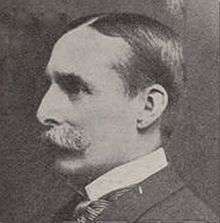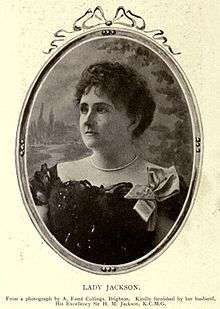Henry Moore Jackson
| Sir Henry Moore Jackson GCMG | |
|---|---|
 | |
| 31st Governor of the Leeward Islands | |
|
In office 1901–1902 | |
| Monarch | Edward VII |
| Preceded by | Sir Francis Fleming |
| Succeeded by | Sir Gerald Strickland |
| 6th High Commissioner for the Western Pacific | |
|
In office 10 September 1902 – 11 October 1904 | |
| Preceded by | Sir William Allardyce (acting) |
| Succeeded by | Everard im Thurn |
| 7th Governor of Fiji | |
|
In office 10 September 1902 – 11 October 1904 | |
| Preceded by | Sir William Allardyce (acting) |
| Succeeded by | Everard im Thurn |
| 5th Governor of Trinidad and Tobago | |
|
In office 30 August 1904 – 29 August 1908 | |
| Preceded by | Cornelius Alfred Moloney |
| Succeeded by | George Le Hunte |
| Personal details | |
| Born |
1849 Grenada |
| Died | 29 August 1908 (aged 58–59) |
| Nationality | British |
| Spouse(s) | Emily Shea (m. 1881) |
| Children | |
| Father | Walrond Jackson |
| Alma mater | Clifton College, Royal Military Academy, Woolwich |
| Religion | Anglican |
For other people named Henry Jackson, see Henry Jackson (disambiguation).
Sir Henry Moore Jackson GCMG (1849 – 29 August 1908) was a British army officer and colonial governor.[1]
Biography
Jackson was born in Grenada to Walrond Jackson, who became the Anglican Bishop of Antigua. He received his education in England at Clifton College and the Royal Military Academy. After his education, Jackson went into the military, serving for the Royal Artillery from 1870 to 1885, reaching the rank of captain. In 1880 while still in the Royal Artillery he was also appointed commandant of the Sierra Leone police.
It was after his military service that he became involved in the rule of British colonies. Starting with his appointment as commissioner for Turks and Caicos Islands from 1885 to 1890 and later Colonial Secretary of the Bahama Islands from 1890 to 1893. His next appointment came in 1894 when he was appointed as Colonial Secretary of Gibraltar from 1894 to 1901. Here his education in science proved useful in implementing a plan to construct a new harbour. In August 1901 he was appointed Governor of the Leeward Islands,[2] but his tenure there was short as in June the following year he was appointed Governor of Fiji and High Commissioner of the Western Pacific.[3] He arrived in Fiji to take up the position in September 1902, and is credited as having promoted the idea of British rule to the natives of Fiji. The last position he held was Governor of Trinidad and Tobago, which he held until his death on 29 August 1908.[4][5]
Jackson received several honours, including: Knight Commander of the Order of St Michael and St George in 1899, promoted to Knight Grand Cross in 1908, and member of the Order of St. Gregory the Great in 1904.
Family

In 1881, Jackson married Emily Shea, daughter of Sir Edward Dalton Shea.[6]
References
- ↑
 Herbermann, Charles, ed. (1913). "Henry Moore Jackson". Catholic Encyclopedia. New York: Robert Appleton Company.
Herbermann, Charles, ed. (1913). "Henry Moore Jackson". Catholic Encyclopedia. New York: Robert Appleton Company. - ↑ The London Gazette: no. 27344. p. 5257. 9 August 1901.
- ↑ The London Gazette: no. 27441. p. 3749. 10 June 1902.
- ↑ James, Roger E.V. (2016-08-01). "Trinidad & Tobago Past & Present Government Officials". TnTisland. Retrieved 2016-11-23.
- ↑ Brereton, Bridget (1981). A History of Modern Trinidad, 1783-1962. Heinemann. p. 152. ISBN 978-0-435-98116-7.
Governor H.M. Jackson (1904-8)
- ↑ Morgan, Henry James, ed. (1903). Types of Canadian women and of women who are or have been connected with Canada. 1. Toronto: William Briggs. p. 174.
| Government offices | ||
|---|---|---|
| Preceded by Sir Francis Fleming |
Governor of the Leeward Islands 1901–1902 |
Succeeded by Sir Gerald Strickland |
| Preceded by William Lamond Allardyce, acting |
High Commissioner for the Western Pacific 1902–1904 |
Succeeded by Sir Everard im Thurn |
| Governor of Fiji 1902–1904 | ||
| Preceded by Sir Cornelius Alfred Moloney |
Governor of Trinidad and Tobago 1904–1908 |
Succeeded by Sir George Ruthven Le Hunte |
This article contains content from HierarchyPedia article Henry Moore Jackson, used here under the GNU Free Documentation License.